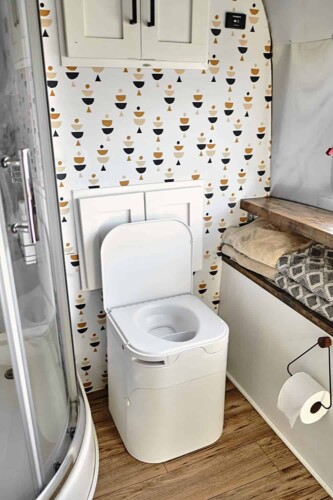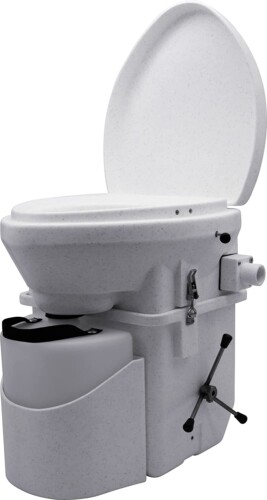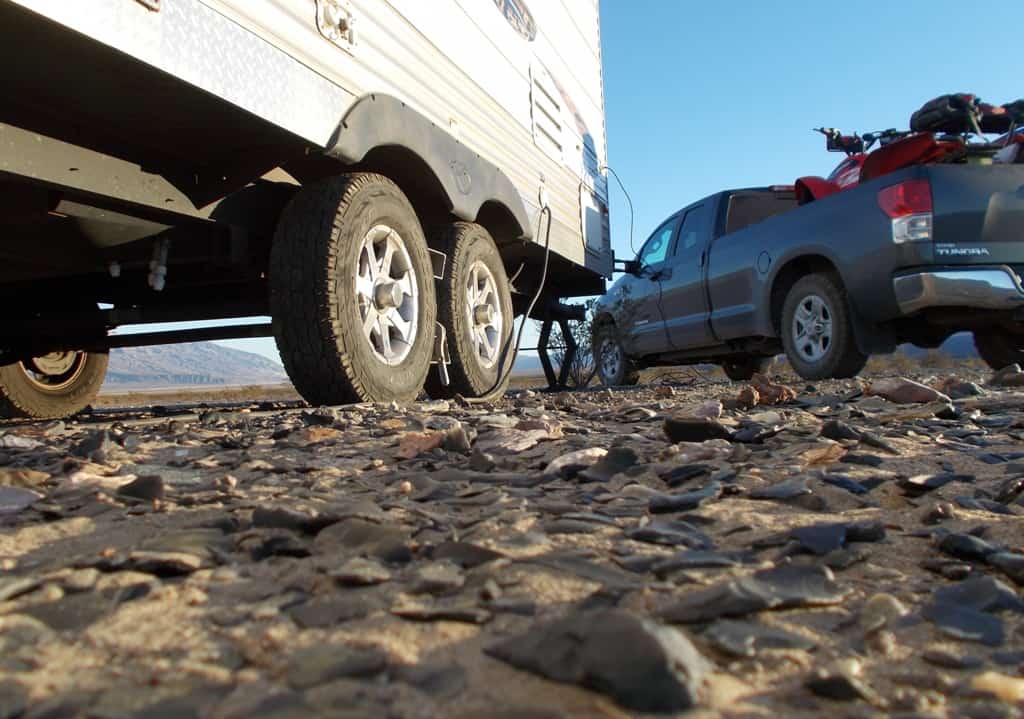Thinking of switching to a waterless toilet for your camper? Take a look at these RV composting toilet pros and cons before making the move.
Love Boondocking? A Waterless RV Toilet Might Be for You
If you love dry camping without electric, water, and sewer hookups, you know that water is the most precious resource for RVers. We cook, clean, eat, and drink with it. And whatever the size of freshwater holding tanks your rig has, you always want more room for water.
The need to store water in your RV is one of the biggest obstacles to long-term boondocking for many RVers. Switching to a waterless RV toilet (also called an RV composting toilet) can save some of that precious liquid. It can give you more time in the backcountry, too. If you enjoy dry camping and want to stay out longer, installing an alternative toilet might make sense.
But like anything, there are upsides and downsides to unconventional home appliances, especially when it comes to RV toilets. Let’s take a look at the pros and cons of RV composting toilets.
Why Switch to an RV Composting Toilet?
Forget the stereotype of the tree-hugging, traveling hippie RVer with a composting toilet. Do any internet search for RV composting toilet reviews and you’ll see that most RVers who switched to a waterless toilet are totally normal people! They did it for common reasons like:
- the ability to dry camp longer
- no more sewer hose “poopsicles” in freezing temperatures
- and to have more waste water holding tank space
Installing a waterless toilet has many benefits. But are they right for every RV lifestyle? Nope. But before we review the pros and cons of RV composting toilets, let’s review what exactly an RV composting toilet is and how it works.

RV Composting Toilets 101
An RV composting toilet is a waterless toilet unit that stores liquid and solid human wastes in two separate compartments. Each time you use the toilet, your urine goes in one removable container. Poop goes into another.
That second container is also a receptacle for an organic add-in material to mix with poop. Peat moss, sawdust, or coconut husks are common add-ins. This matter works exactly like cat litter, but for people waste.
The add-in moss, coconut chips, etc., helps dry and break down waste into a compost-like organic matter. Give it enough time to break down, and the end result is technically fertilizer, or “humanure.”
The composting toilet has an aerator handle for mixing the two materials. Many RV composting toilets also require installation of a fan to ventilate odors from the storage container.
Do RV Composting Toilets Smell? Why do they separate Urine and Poop?
RV composting toilets separate liquids from solids for a good reason. When urine and feces are combined, the byproduct is sewage, and it has a nasty odor. This is why a traditional RV black water tank starts to stink when it gets full. By not combining liquid and solid waste, you technically get an odor-free waterless toilet in your RV.
Unfortunately, that’s now always how RV composting toilets work out in the long run.
The Pros and Cons of RV Composting Toilets
RVers who switched to waterless toilets have plenty to say about whether or not RV composting toilets are worth it.
The biggest pros of RV composting toilets include:
- No more dealing with sewer hoses, RV dump stations, and the black tank dumping process.
- You’ll have unused black tank space that can be repurposed into another graywater tank.
- RV composting toilets save water. This means more fresh water for household use.
- More fresh water + additional holding tank space = more days to dry camp in gorgeous spots.
The biggest cons of RV composting toilets include:
- Waterless toilets are larger than traditional RV toilets. They take up more bathroom space.
- You need to carry bags of mixing medium at all times.
- You get up close with your waste. For example, the urine container must be emptied every few days. Forget to do it, and the container will overflow. Bagging used toilet paper in a wastebasket is also suggested to prevent clogs in the holding receptacle.
- Removing your solid waste requires emptying the poop bin, bagging and disposing of it somewhere legal (in most cases, a dumpster is fine).
- Finally, there’s the cost of RV composting toilets. Most over in the $1,000 range just for the unit. Installation parts and labor add to the expense.

So Why Switch to an RV Composting Toilet?
Whether you want to buy a composting toilet for a trailer, camper, or motorhome, if you love the idea of having more water to use in the backcountry, an RV composting toilet might be a great idea. But that’s only if you can deal with all of the downsides of an alternative RV toilet. Ask any RVer who switched to one, and they all disclose one important thing:
It doesn’t matter if you buy the best RV composting toilet, or make a DIY composting latrine, there’s just no getting away from the fact having one requires you to get up close and personal with poop and urine.
If you can deal with that dirty truth about RV composting toilets, then making the switch might be a perfect choice for your RV lifestyle.
Learn More About RV Composing Toilets
Check out a great waterless toilet review from iRV2 Forums member @grabcon: Composting toilets are they for you?
Composting toilets are they for you? Why do you want one? What do you gain? These are question you need to answer. Also: Are you comfortable being different?
@Grabcon, iRV2 Forums Member
I have been using a composting toilet for 2 1/2 years now in a full-time RV life with two people. We have used to different brands and both have pros and cons. Would I install a composting toilet in another RV? Yes!
The Best Composting Toilet for RVs
Composting toilets use no water and allow you to camp without a black tank. Find out the best composting toilet for RVs and why we chose it.
One of the most popular options in both the RV and marine space for a composting toilet is the OGO Compost Toilet. With its power agitation, patented urine diversion technology, built-in liquid Sensor and other available options, the OGO compost toilet is easy to use and easy to clean. No black tank is needed, has no odor, and chemical free.
Watch this helpful RV composting toilet review video from a full-time RVing couple:
Do you have an RV composting toilet? Share your feedback and experience below. We’d love to know how it works for your camping and RV travel needs.




